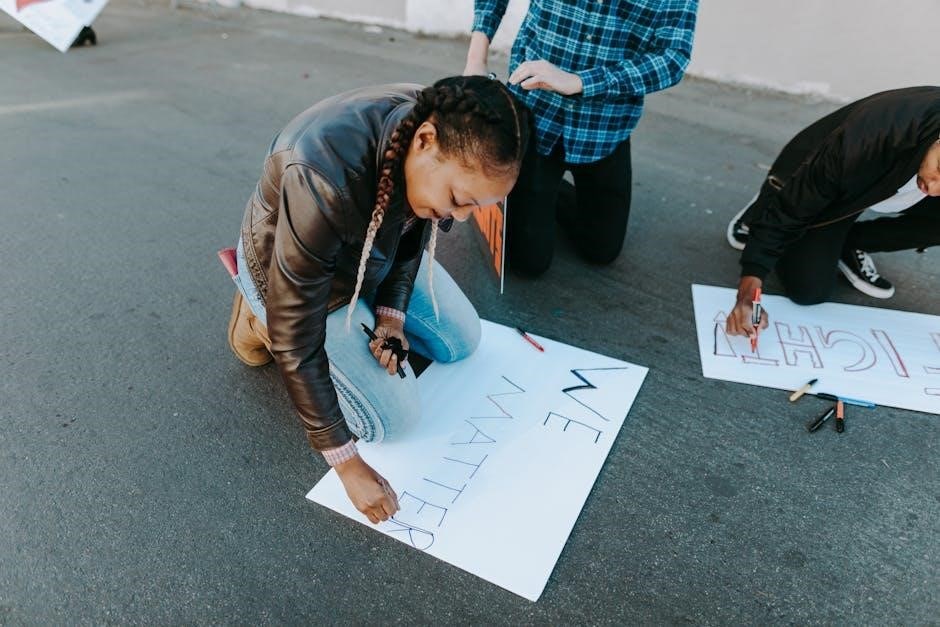
The Black Feminist Guide to the Human Body is an empowering exploration of Black women’s experiences‚ resilience‚ and intersectionality‚ offering a celebration of their lives and bodies.
Overview of the Importance of Black Feminist Perspectives on the Body
Black feminist perspectives on the body are crucial for understanding the intersections of race‚ gender‚ and class‚ offering a unique lens to address systemic inequalities. These perspectives illuminate how Black women’s bodies have historically been marginalized‚ fetishized‚ and policed. By centering Black women’s voices‚ they challenge dominant narratives and reclaim agency over their own bodies. This framework also highlights the resilience and resistance of Black women‚ emphasizing the need to dismantle oppressive structures. It is a vital tool for fostering liberation and equity in health‚ sexuality‚ and self-expression.
Historical Context: Black Women’s Bodies in Society
The historical context of Black women’s bodies in society reveals a legacy of exploitation‚ marginalization‚ and resilience. From slavery to segregation‚ Black women’s bodies were subjected to systemic control and commodification. The intersection of race‚ gender‚ and class created unique forms of oppression‚ with their bodies often being fetishized and policed. This history has shaped contemporary disparities in health‚ representation‚ and societal treatment. Understanding this context is essential for addressing the ongoing struggles and celebrating the resistance and resilience of Black women.
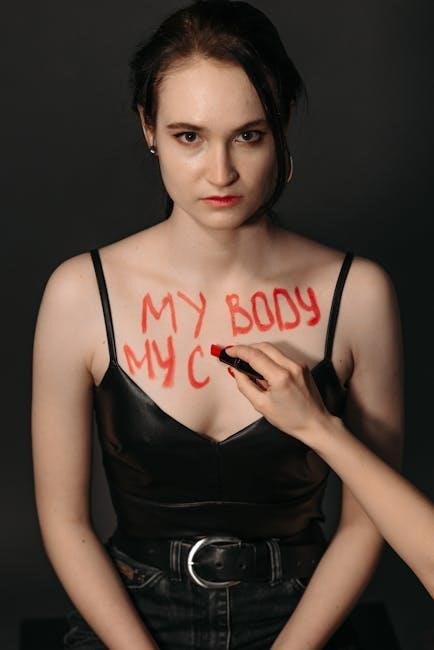
Patricia Hill Collins and Black Feminist Thought
Patricia Hill Collins’ groundbreaking work on Black Feminist Thought provides a powerful framework for understanding race‚ gender‚ and class intersections‚ empowering Black women’s voices and experiences.
The Social Construction of Black Feminist Thought
Black Feminist Thought‚ as conceptualized by Patricia Hill Collins‚ examines how race‚ gender‚ and class intersect to shape the experiences of Black women. This framework critiques dominant knowledge systems‚ emphasizing the importance of lived experiences and collective resistance. Collins’ work highlights the historical and social processes that construct Black women’s identities‚ challenging traditional power structures and fostering a deeper understanding of intersectionality. By centering Black women’s voices‚ this theory provides a powerful lens for addressing systemic inequalities and promoting liberation.
Intersectionality and the Black Female Body
Intersectionality‚ a term coined by Kimberlé Crenshaw‚ examines how overlapping systems of oppression—such as racism‚ sexism‚ and classism—shape the lived experiences of Black women. The Black female body is a site where these intersections converge‚ often leading to unique challenges and disparities. This framework highlights how systemic discrimination and stereotypes disproportionately affect Black women‚ emphasizing the need to address these inequalities in health‚ economics‚ and societal representation. By recognizing these intersections‚ Black feminist thought advocates for holistic approaches to liberation and justice.
The Superwoman Schema and Black Women’s Health
The Superwoman Schema describes the cultural expectation that Black women must be strong and self-sacrificing‚ often leading to neglect of their own physical and mental health.
Understanding the Superwoman Schema (SWS)
The Superwoman Schema (SWS) is a cultural construct that portrays Black women as inherently strong‚ resilient‚ and self-sacrificing. Rooted in historical stereotypes‚ it demands that Black women endure systemic oppression without vulnerability or complaint. This schema often glorifies their ability to multitask‚ care for others‚ and thrive under adversity. However‚ it ignores the physical and emotional toll this expectation takes‚ fostering a culture where Black women neglect their own needs. The SWS is deeply intertwined with societal expectations of Black womanhood‚ making it a critical area of study in Black feminist discourse.
Physical and Mental Health Implications of the SWS
The Superwoman Schema (SWS) perpetuates harmful health outcomes for Black women. Chronic stress from societal expectations leads to conditions like hypertension and diabetes. Mentally‚ the pressure to suppress emotions and prioritize others’ needs fosters anxiety and depression. The stigma of vulnerability discourages seeking help‚ exacerbating mental health struggles. Physically‚ neglect of self-care due to caregiving roles results in poor health outcomes. The SWS intersects with systemic inequalities‚ further endangering Black women’s well-being and highlighting the urgent need for dismantling this oppressive narrative.

Black Feminist Approaches to Aging and Health
Black feminist approaches emphasize aging as a natural process‚ challenging societal norms that devalue aging Black women. They advocate for holistic health practices‚ addressing physical‚ mental‚ and spiritual well-being while combating systemic healthcare disparities. Aging is framed as a symbol of resilience and wisdom‚ encouraging community support and self-care. These approaches also highlight the importance of policy changes to ensure equitable access to quality healthcare for aging Black women‚ fostering a culture of respect and empowerment.
Aging and Health Disparities in Black Women
Black women face significant health disparities as they age‚ often due to systemic racism and socioeconomic barriers. Chronic illnesses like hypertension and diabetes disproportionately affect this group‚ compounded by limited access to quality healthcare. Black feminist approaches highlight the intersection of race‚ gender‚ and age‚ emphasizing the need for culturally competent care. These perspectives also address the psychological toll of discrimination and the lack of representation in medical research. Advocating for equitable resources and policies is crucial to ensuring healthier aging outcomes for Black women.
Radical Self-Acceptance and Self-Compassion in Aging
Black feminist approaches emphasize radical self-acceptance as a powerful tool for aging Black women to reclaim their bodies and identities. By rejecting societal beauty norms that devalue aging and dark skin‚ Black women can embrace their natural beauty and wisdom. Self-compassion fosters mental well-being‚ countering the internalized oppression that often accompanies aging. This practice encourages Black women to celebrate their resilience and experiences‚ promoting a holistic understanding of aging as a natural‚ dignified process. It advocates for self-love as a form of resistance and liberation.

Capitalism and the Exploitation of Black Women’s Bodies
Capitalism perpetuates systemic exploitation of Black women’s bodies through commodification‚ labor inequality‚ and racialized beauty standards‚ reinforcing economic and social disparities rooted in intersectional oppression.
Capitalism’s Impact on Black Women’s Health and Beauty Standards
Capitalism perpetuates harmful beauty standards that marginalize Black women‚ elevating Eurocentric features while devaluing Black aesthetics. The beauty industry profits from products targeting Black women‚ often promoting harmful chemicals and unattainable ideals. This exploitation exacerbates health disparities‚ as Black women face limited access to equitable healthcare. Capitalist systems also exploit Black women’s labor‚ fostering environments that neglect their physical and mental well-being. These structures perpetuate systemic racism‚ further entrenching health and beauty inequalities faced by Black women in capitalist societies.
Economic Exploitation and Labor Inequalities
Black women face systemic economic exploitation‚ often undervalued in the workforce and subjected to wage disparities. Capitalist structures perpetuate racial and gender pay gaps‚ with Black women earning significantly less than their white male counterparts. Lack of job security‚ limited career advancement‚ and inadequate benefits further marginalize them. These inequalities disproportionately affect their health‚ as financial instability limits access to quality healthcare. The devaluation of Black women’s labor reflects broader societal disregard for their well-being‚ perpetuating cycles of economic and health disparities.
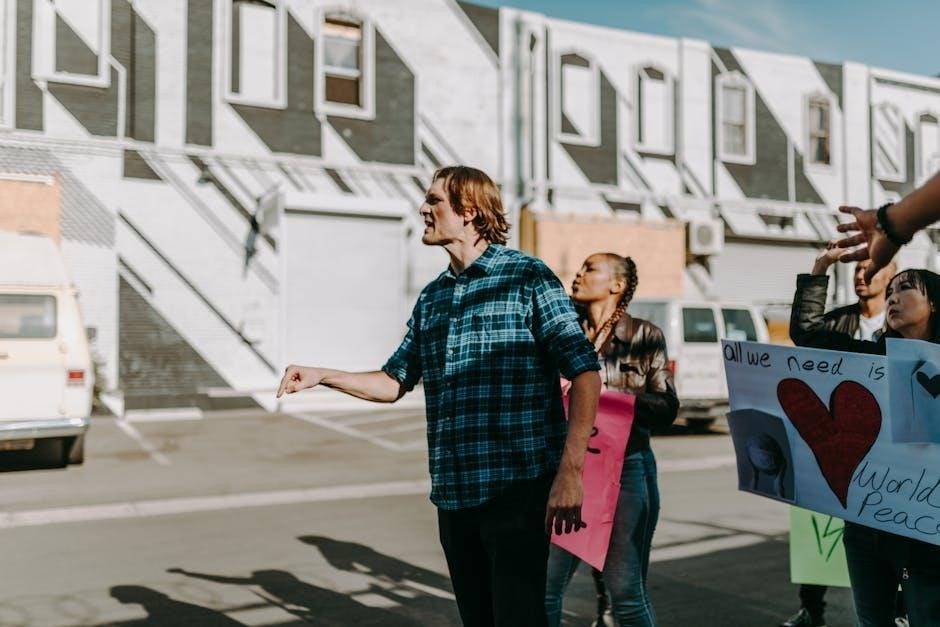
Beauty Standards and Body Image
Beauty standards and body image significantly impact Black women‚ often rooted in Eurocentric ideals. These standards perpetuate exclusion‚ self-doubt‚ and internalized racism‚ affecting self-esteem and identity deeply.
Hair Texture‚ Skin Tone‚ and Body Shape in Black Culture
Hair texture‚ skin tone‚ and body shape are deeply intertwined with identity in Black culture‚ reflecting diverse expressions of beauty. Eurocentric standards have historically marginalized Black features‚ fostering internalized racism and self-doubt. The celebration of kinky hair‚ darker skin‚ and fuller figures is a form of resistance against societal norms. Black women are reclaiming their bodies‚ embracing uniqueness and rejecting narrow definitions of beauty. This shift promotes self-love and challenges the erasure of Black aesthetics in media and culture‚ fostering a more inclusive understanding of beauty and identity.
Media Representation and the Erasure of Black Women’s Bodies
Black women’s bodies are frequently erased or marginalized in media‚ perpetuating Eurocentric beauty standards. The lack of diverse representation reinforces stereotypes‚ limiting their visibility and influence. This erasure affects self-esteem‚ societal perceptions‚ and opportunities‚ contributing to systemic inequality. Advocacy for inclusive media is crucial to challenge these narratives and promote accurate‚ empowering portrayals of Black women’s bodies and identities‚ fostering a more equitable representation in society.
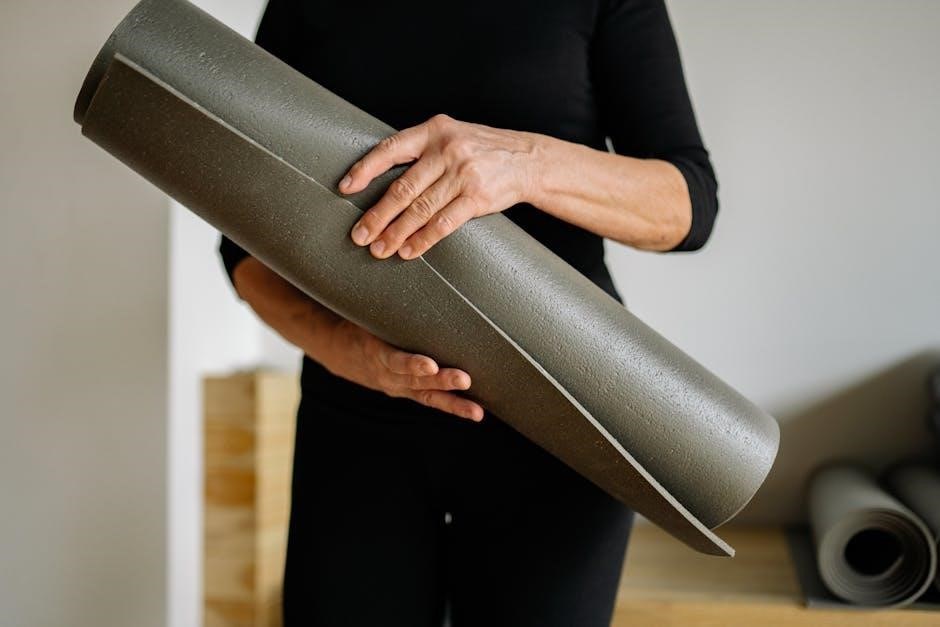
Black Feminist Spirituality and the Body
Black feminist spirituality emphasizes the interconnectedness of mind‚ body‚ and soul‚ offering a holistic approach to healing and self-liberation. Rooted in ancestral traditions‚ it challenges oppressive systems by reclaiming sacredness and wholeness‚ fostering resilience and empowerment.
Spirituality as a Form of Resistance and Healing
Spirituality serves as a powerful tool for Black women to resist systemic oppression and heal from trauma. Rooted in African diasporic traditions‚ it fosters a connection to ancestors and communal strength. By reclaiming sacred practices‚ Black women challenge dominant narratives that devalue their bodies and reclaim their humanity. Spirituality becomes both a personal and collective act of defiance‚ offering solace‚ empowerment‚ and a framework for holistic well-being. It emphasizes self-worth and resilience‚ counteracting the harm inflicted by racism and sexism. Through spirituality‚ healing transcends the physical‚ embracing mental and emotional restoration.
Intersection of Spirituality and Physical Health
Spirituality deeply influences Black women’s physical health‚ offering a holistic approach to well-being. Practices like meditation‚ prayer‚ and rituals foster emotional balance‚ reducing stress and anxiety. By connecting spiritual harmony with bodily health‚ Black women counteract the toll of systemic racism and gendered violence. Studies show that spiritual engagement can lower blood pressure‚ improve mental health‚ and enhance resilience. This intersection emphasizes the body as a sacred vessel‚ encouraging self-care and empowerment while challenging harmful narratives about Black women’s bodies and health outcomes.
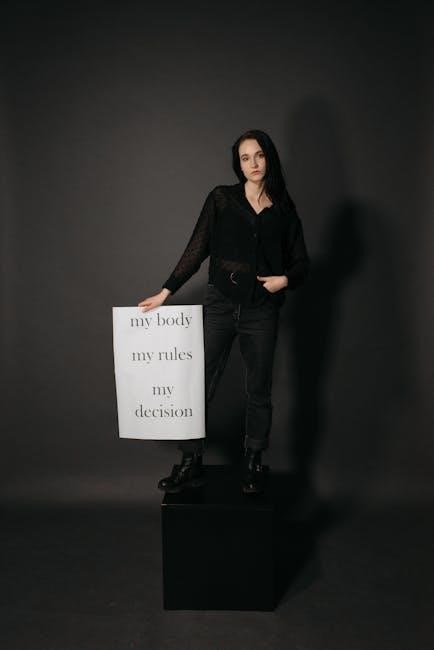
Black Women’s Bodies in Public Spaces
Black women’s bodies are often hypersexualized and policed in public spaces‚ reflecting deep-rooted stereotypes and systemic oppression. This scrutiny stems from historical legacies of slavery and colonialism. Resistance lies in reclaiming agency and challenging these norms through confidence and unapologetic presence.
Politicization of Black Women’s Bodies in Public Discourse
The bodies of Black women have historically been subjected to intense scrutiny and political debate‚ often serving as symbols of societal anxieties. From slavery to modern-day racial profiling‚ Black women’s bodies are frequently commodified‚ objectified‚ and policed in public spaces. This politicization perpetuates harmful stereotypes‚ reinforcing systemic inequalities. The emotional and psychological toll of such treatment is profound‚ yet Black women continue to resist these narratives through resilience and unapologetic self-expression‚ reclaiming their bodies as sites of power and autonomy in a society that seeks to control them.
Resilience and Resistance in Public Spaces
Black women’s resilience in public spaces is a testament to their strength and defiance against systemic oppression. Through acts of resistance‚ such as reclaiming their voices and challenging stereotypes‚ Black women assert their humanity and dignity. Whether through protests‚ art‚ or everyday acts of self-expression‚ their resilience transforms public spaces into sites of empowerment. By rejecting marginalization and embracing their identities‚ Black women create a powerful counter-narrative‚ fostering solidarity and inspiring collective action for liberation and justice in a world that often seeks to erase them.

Black Feminist Activism and the Body
Black feminist activism redefines the body as a site of empowerment‚ challenging oppressive systems and reclaiming agency through collective action and grassroots movements;
Modern Activism: Black Feminist Hashtag Movements
Black feminist hashtag movements‚ such as #BlackLivesMatter and #SayHerName‚ have transformed activism by amplifying Black women’s voices and challenging systemic oppression. These digital campaigns create spaces for dialogue‚ empowerment‚ and resistance‚ addressing issues like police violence‚ gender-based violence‚ and intersectional inequality. By leveraging social media‚ Black feminists have shifted narratives‚ fostering global solidarity and visibility for marginalized bodies. These movements not only highlight injustices but also celebrate Black women’s resilience‚ redefining what it means to embody strength and activism in the modern era.
Community Guide and Collective Diary of Black Women’s Experiences
A community guide and collective diary of Black women’s experiences serve as a powerful tool for empowerment and solidarity. By sharing personal narratives‚ Black women create a space for authenticity and validation. These platforms highlight the diversity of Black womanhood‚ offering stories of resilience‚ joy‚ and struggle. They also provide resources and support‚ addressing physical‚ emotional‚ and mental well-being. Through shared experiences‚ the guide fosters connection and understanding‚ celebrating the richness of Black women’s lives while challenging societal norms that seek to erase their humanity.
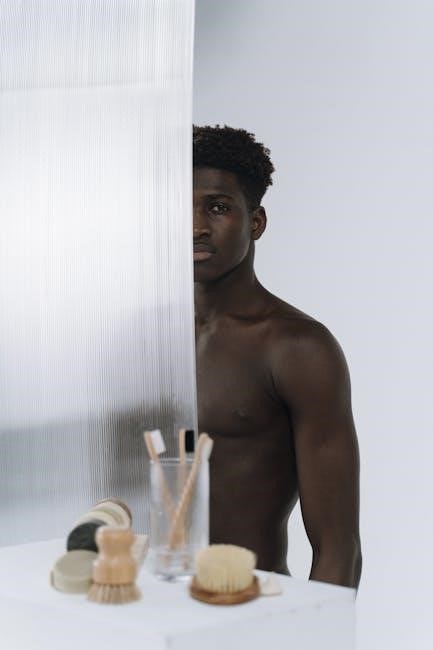
Black Feminist Perspectives on Sexuality
Black feminist perspectives on sexuality emphasize intersectionality‚ challenging stereotypes‚ and reclaiming agency. They promote empowerment and self-expression‚ advocating for bodily autonomy and sexual freedom within cultural contexts.
Constructing Ideas About Black Womanhood and Sexuality
Black womanhood and sexuality are deeply shaped by historical and cultural narratives rooted in stereotypes and oppression. The hypersexualization of Black women‚ stemming from colonial and enslavement periods‚ has led to harmful tropes like the “Jezebel” figure‚ which perpetuates objectification. These constructions have been internalized‚ often limiting self-perception and autonomy. Black feminist thought challenges these narratives‚ advocating for self-defined sexuality and bodily agency‚ while addressing the intersections of race‚ gender‚ and power that influence Black women’s experiences of intimacy and sexual expression.
Challenging Stereotypes and Narratives
Black feminist thought actively dismantles harmful stereotypes surrounding Black women’s sexuality‚ which have historically been shaped by racism and misogyny. The objectification and desexualization of Black women’s bodies are rooted in colonial and patriarchal narratives. By reclaiming their sexuality and challenging Eurocentric beauty standards‚ Black women assert their autonomy and redefine their experiences. This resistance fosters a space for self-love‚ empowerment‚ and unapologetic expression‚ combating systemic oppression and fostering collective liberation. Black feminist perspectives emphasize the importance of self-defined sexuality and bodily agency.
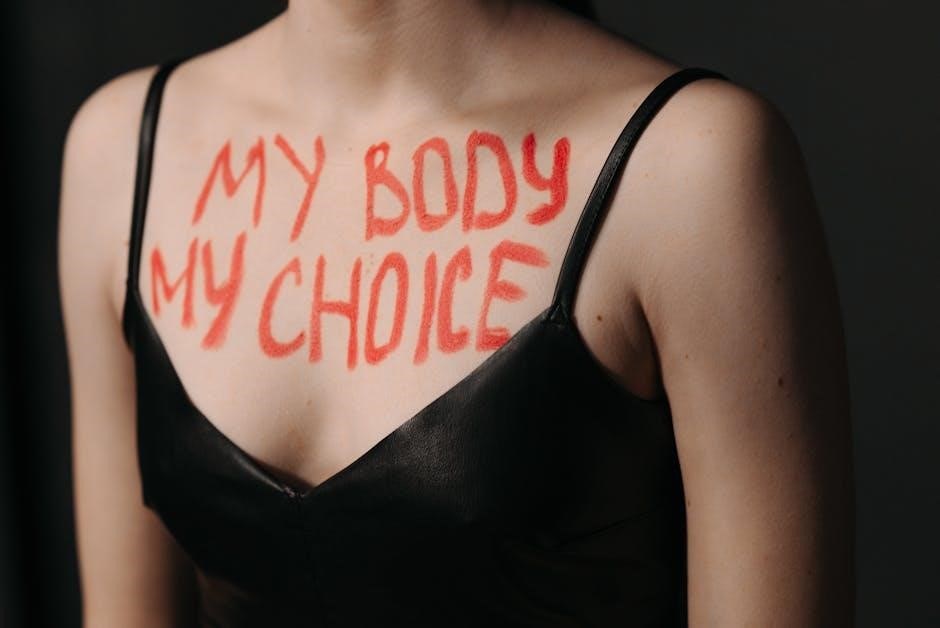
Black Feminist Guide to the Human Body in Theatre and Art
Theatre and art amplify Black women’s voices‚ celebrating their bodies and challenging stereotypes through powerful narratives and transformative visual expressions of identity.
Lisa B. Thompson’s Play: A Celebration of Black Women’s Lives
Lisa B. Thompson’s work is a profound tribute to Black women’s resilience and beauty‚ using theatre to explore themes of identity‚ strength‚ and vulnerability. Her plays often center on the lived experiences of Black women‚ challenging societal norms and celebrating their humanity. Through vivid storytelling and powerful characters‚ Thompson’s artistry highlights the intersections of race‚ gender‚ and body politics‚ offering a liberating narrative that honors the richness of Black womanhood and fosters connection and empowerment.
Using Art as a Tool for Radical Self-Expression
Black women harness art to reclaim and celebrate their bodies‚ challenging oppressive narratives. Through painting‚ poetry‚ and performance‚ they express resilience and defiance‚ redefining beauty and identity. Art becomes a space for healing and resistance‚ amplifying voices and fostering solidarity. By centering their experiences‚ Black feminists transform art into a powerful medium for liberation‚ asserting their humanity and dignity in a world that often seeks to erase them. This creative expression fosters empowerment and collective strength.
Black feminist thought will continue to evolve‚ redefining health‚ identity‚ and beauty‚ inspiring collective action and radical self-acceptance for liberation and bodily autonomy.
Call to Action: Radical Self-Acceptance and Collective Freedom
Embracing radical self-acceptance is a powerful act of resistance‚ urging Black women to reclaim their bodies from societal constraints. By rejecting oppressive beauty standards and valuing authenticity‚ individuals can foster collective freedom. This movement calls for the dismantling of systems that marginalize Black women‚ advocating for equity in healthcare‚ representation‚ and economic opportunities. It encourages sisterhood and solidarity‚ celebrating diverse bodies and experiences. Together‚ Black women can challenge stereotypes and create a future where their bodies are valued‚ respected‚ and free from exploitation.
Final Thoughts on the Resilience and Power of Black Women
Black women embody unparalleled resilience‚ navigating intersecting oppressions while fostering strength and community. Their bodies‚ often subjected to societal scrutiny‚ are testaments to endurance and vitality. Through centuries of resistance‚ Black women have redefined power‚ challenging norms and reclaiming their humanity. Their contributions to culture‚ activism‚ and intellect are immeasurable‚ inspiring future generations. Celebrating their resilience is not just an acknowledgment of their past but a tribute to their enduring impact on the world.